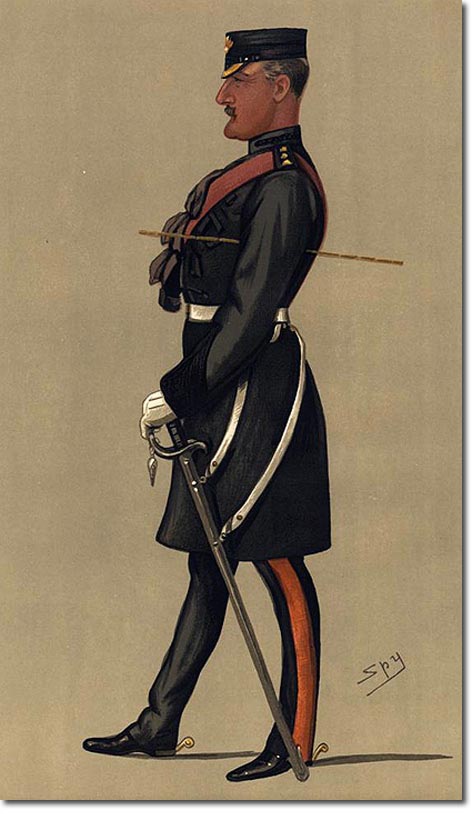|
|

 |
|
Eaton was the son of Henry Eaton, 1st Baron Cheylesmore and his wife Charlotte Gorham Harman. His father made money in the silk trade, helped to manage Insurance Companies and was MP for Coventry. Eaton was educated at Eton, in Mr. Warre's house. He was nicknamed "Cheeky Eaton" and rowed bow in the winning Eton House four crew in 1866. He also shot for Eton in the Ashburton Shield in 1866. At the age of 20 he joined the Grenadier Guards, and went to Dublin, where he was given the nickname "Brown" by his brother officers. He rowed for the 1st Battalion Grenadier Guards in the 1877 Grand Challenge Cup at Henley Royal Regatta.
His father became Baron Cheylesmore of Cheylesmore, in Coventry, in 1887 and had to give up his parliamentary seat. In the ensuing by-election Eaton stood for the seat but failed to be elected by 16 votes. He first appeared in Vanity Fair in 1891 as commander of the 2nd Battalion, Grenadier Guards, which he had "just brought back from a well-deserved, if enforced, holiday in Bermuda. As some curious punishment, the entire battalion had been sent there for a year following 'an act of insubordination. While there in 1891, he met Elizabeth Richardson French, daughter of Francis Ormond French of New York, and married her back in London on 14 July 1892. He became Major-General in 1899 and given command of the Grenadier Guards. He was appointed a Knight of Grace of the Order of St. John (KStJ) in July 1901. On the death of his brother on 10 July 1902, Eaton succeeded to the title of 3rd Baron Cheylesmore,and made his maiden speech in the House of Lords in November that year. Cheylesmore was an alderman of Westminster City Council, and Mayor of Westminster for 1905-06. In December 1907, he was appointed a deputy lieutenant of Middlesex. On 17 January 1911, Baroness Cheylesmore purchased the Cooper's Hill property at Runnymede, previously used by the Royal Indian Engineering College, for use as a family home. In April 1912, Cheylesmore became Chairman of London County Council. In this capacity, he opened the Woolwich foot tunnel on Saturday, 26 October 1912. At the outbreak of World War I, Cheylesmore became commandant of a School of Musketry at Bisley Camp, where the ranges were put at the disposal of the Army Council. The school was to train and provide instructors in musketry from those who had passed the age of military service. The School trained some 14,500 officers, NCOs and civilians for service in the Army and Territorial Force. During the war he presided over several courts-martial including that which condemned the spy Carl Hans Lody to death. Cheylesmore was honoured Knight Grand Cross of the Order of the British Empire in June 1925. He died a month later aged 77, in a motor accident, the first peer to suffer such a fate in Britain. The family was desolated and a great ballroom, known as the Pillar Hall at Coopers Hill, which was being built for the coming of age of their heir, was left unfinished. He is commemorated by a monument by Edwin Lutyens in the Embankment Gardens. The Cheylesmore Range at Bisley named after him was opened for the 1948 Summer Olympics. His son Francis Ormond Henry Eaton, 4th Baron Cheylesmore succeeded to the Barony: on the fourth Baron's death in 1985, the Barony became extinct. |
Regimental details | Commanding Officers
Armed Forces | Art and Culture | Articles | Biographies | Colonies | Discussion | Glossary | Home | Library | Links | Map Room | Sources and Media | Science and Technology | Search | Student Zone | Timelines | TV & Film | Wargames